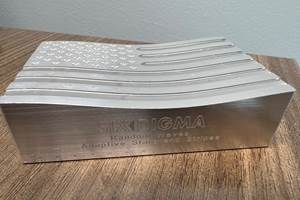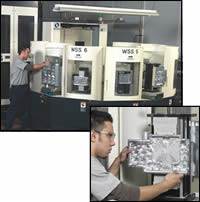It Begins With Belief
This shop’s approach to unattended machining focuses on the big picture.
Share





At Highland Products, a Mentor, Ohio-based job shop specializing in CNC Swiss-type machining, unattended production is more than just a process—it’s a philosophy. While high-tech equipment and machining expertise contributes to the shop’s success, its mindset about lights-out manufacturing is just as important. Running lights-out allows the shop to commit to a 40-hour work week with no overtime (which is sometimes an obstacle to finding new employees). Beyond the 40 hours that are supervised, unattended machining provides all the capacity this busy shop needs.
During my recent visit, company president Mark Erickson and plant
manager Matt Nolan explained Highland’s approach to lights-out manufacturing.
The shop has found success by:
- Focusing on quality and throughput rather than cost and cycle time
- Not distinguishing between attended and unattended operations
- Integrating preventive maintenance into daily operations
- Emphasizing continuous improvement
The first step to running unattended is to believe you can do it, Mr. Nolan says. It’s a simple, but fundamental, philosophical commitment.
For Mr. Erickson, who founded Highland more than 30 years ago, obtaining this belief began with an unexpected move from using conventional lathes to specializing solely in CNC Swiss-type machining.
Shifting The Focus
“I basically backed into Swiss turning,” Mr. Erickson says. In the beginning, the shop’s equipment primarily consisted of conventional turning centers. When a customer suggested a Swiss-type turning center for an order of 500 medical parts, Mr. Erickson purchased his first Swiss-type from Marubeni Citizen-Cincom (Allendale, New Jersey). Unfortunately, the customer canceled the order, and Highland was left with a sophisticated machine for which it seemed to have no use.
Luckily, a neighboring job shop was having trouble machining a hydraulic piston, a tough part it had been making in two operations on a conventional lathe. After asking the distributor that sold him the Citizen lathe (Concentric Corporation, Cleveland, Ohio) to help set up the new machine, Mr. Erickson completed the part in 88 seconds. This was much better than the neighboring shop’s cycle time of 25 minutes. Soon after, Highland was awarded a contract to produce 2,500 of the pistons.
It didn’t take long for Mr. Erickson to realize the benefits that CNC Swiss-type machines could bring. Competition was high for work that could be done on conventional turning centers, and using Swiss-type turning centers to machine small, often complex parts was a niche he was more than willing to fill. In addition, when equipped with bar feeders from LNS America (Cincinnati, Ohio), the shop’s new Swiss-type machines were easy to set up for lights-out operation. Shortly after Mr. Nolan came onboard, ostensibly to run the new Swiss-type machines while Mr. Erickson focused on the conventional turning centers, the two decided to concentrate solely on Swiss turning.
The Right Tools For The Job
Today, Highland has 15 CNC Swiss-type turning centers, consisting mainly of Citizen M- and L-series machines. These are used to run jobs for the medical, aerospace, automotive and telecommunications industries (among others) in part quantities ranging from one to 1 million. Typical jobs take three to four days to run, Mr. Erickson says.
Recently, the shop replaced about half of these machines with newer Citizen models. Such widespread replacement is a common practice at Highland, which phases out machines every five or six years to stay abreast of the latest technology. Mr. Erickson says the enhancements to his newest machines—particularly design and control improvements—have improved cycle times by 40 percent.
Replacing machines so often may seem like a huge investment, but Highland comes out ahead. The primary reason the shop upgrades machines is not because they are worn out, but to take advantage of the latest technology. Thus, the old machines are still valuable, and the shop can get back as much as 70 percent of its investment, Mr. Erickson says. The shop treats the machines well as a part of a philosophy of treating the workpieces well.
Value Is The Bottom Line
“We don’t make parts; we make jewels,” he says. That simple statement, which Mr. Erickson attempts to emphasize to all employees, epitomizes a key component of Highland’s approach to unattended machining. Lights-out production is a side effect of a process designed to provide customers with the highest-quality parts possible.
Many shops put too much emphasis on achieving short cycle times, a benchmark that misses the point, Mr. Nolan says. At Highland, the goal is to create a stable overall process that consistently delivers high-quality parts. If achieving better throughput and higher-quality parts takes longer cycle times, so be it.
In fact, only Mr. Erickson and Mr. Nolan know the cycle time on which a given quote is based. This encourages employees to focus on the big picture rather than worry about whether they are hitting cycle time expectations.
The shop’s emphasis on quality extends beyond just finished parts—it settles for nothing less than top-quality raw materials and other basic items. As Mr. Erickson puts it, “You can’t put inconsistent things in and expect consistent things to come out.”
To that end, the shop pays top dollar for coolant. While $10 to $12 per gallon seems expensive to some other shops, the coolant lasts long enough to make this investment more than worth it, Mr. Erickson says. Thanks to a quality filtration system, the coolant typically stays in the machines until they are sold. “The bottom line is value, not price,” he says.
All Jobs Are Created Equal
Highland employees don’t think of jobs in terms of “manned” or “unmanned” because every job is assumed to be unmanned. The shop designs the process the same way regardless of whether anyone is there to oversee it.
In Highland’s view, using different feed rates, speeds and other parameters based on whether a job is attended doesn’t make sense at all. Inconsistencies in the way parts are processed lead to inconsistent parts. “The idea is to develop a good process that you can use all the time,” Mr. Nolan says.
After creating a process, Highland views lights-out operation as an added benefit rather than as something it has to achieve to make money on the job. After the company proves out the job during the day while operators are present, it takes a conservative approach to running unattended. For example, if a cutting tool can handle 500 parts before wear sets in, the machine might be set up to produce only 250 parts after everyone leaves for the day. Running this far short of expected tool life ensures that only quality parts are produced. In the shop’s view, it has produced 250 more parts almost for free—that is, with no attention and very little extra expense.
“Unattended does not mean 24/7,” Mr. Erickson says. “We run unattended to get what extra parts we can. Unattended is used as ‘gravy’—a benefit rather than something we have to bank on.”
A Holistic Approach To PM
One of the most striking aspects of the shop’s thinking is that it doesn’t treat preventive maintenance as a separate discipline with a separate schedule. Rather, the shop integrates it into production. For example, operators strip out all tooling and maintenance items and thoroughly clean each machine after every job. Built-up gunk can impede the gears of milling sleeves over time, Mr. Erickson says. He’s seen the problem in other shops. However, it’s a non-issue at Highland, where operators take out the sleeves and check the bearings after every job.
This approach to PM is a big part of the reason why the machines keep their value longer, Mr. Nolan says. In addition, by making each machine “like new” after every job, employees learn the ins and outs of the equipment they operate. Troubleshooting problems becomes much easier.
“We don’t avoid setup, we get good at setup,” Mr. Nolan says. “All these time-consuming steps we do daily ultimately give us higher throughput.”
Improving The Process
Highland’s approach to unattended machining didn’t materialize out of thin air—it is the result of following a doctrine of continuous improvement that underlies practically every operation. To encourage active participation in this improvement, employees are awarded gift certificates for good ideas.
The company’s commitment to continuous improvement is perhaps best exemplified by a small container of molten plastic in the shop’s presetter area. After a job is finished, the tools are dipped in the hot plastic and placed into a drawer with a tag identifying the job and the name of the customer. When that job comes up again, operators can reuse the tools. If the tools are worn, the operator can examine the pattern of wear for clues about how to improve that particular process and produce even finer-quality “jewels” the next time around.
Related Content
Custom Workholding Shaves Days From Medical Part Setup Times
Custom workholding enabled Resolve Surgical Technologies to place all sizes of one trauma part onto a single machine — and cut days from the setup times.
Read MoreBuilding Machines and Apprenticeships In-House: 5-Axis Live
Universal machines were the main draw of Grob’s 5-Axis Live — though the company’s apprenticeship and support proved equally impressive.
Read MoreGrob Mill-Turn Machining Center Provides Flexible Performance
The G550T mill-turn universal machining center offers optimized milling and turning performance for a broad range of part materials in one setup.
Read MoreMultitasking Machines Cut Days From Shop’s Setups
Adopting WFL Millturn machines enabled BWXT to condense operations and setups while also providing a simple way to simulate and secure processes.
Read MoreRead Next
Where Is Your Wiggle Room?
"Lights out" doesn’t require an intense commitment. This job shop achieves flexible unattended machining when it needs it using palletized HMCs.
Read More5 Rules of Thumb for Buying CNC Machine Tools
Use these tips to carefully plan your machine tool purchases and to avoid regretting your decision later.
Read More

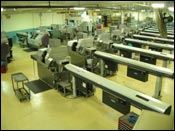
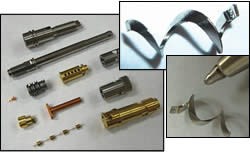
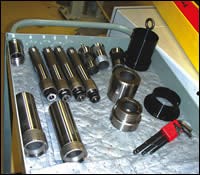
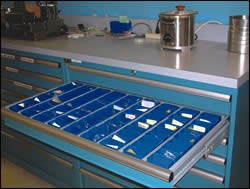
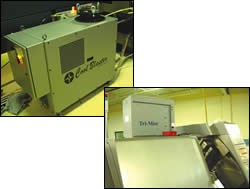


















.jpg;maxWidth=300;quality=90)




